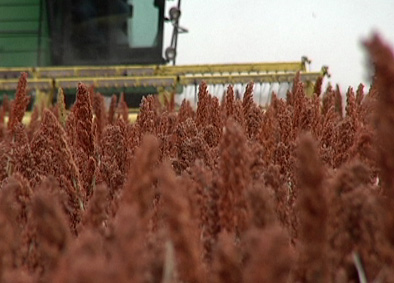Nebraska Grain Sorghum Board member John Dvoracek says that with hundreds of varieties from Africa, tropical islands, and other exotic lands, sorghum can grow just about anywhere.
“Sorghum is grown basically clear from the Gulf of Mexico clear up to actually the North Dakota border,” he says.
Dvoracek says market loss and improvements in corn and soybeans drove producers away, but changes in the ethanol industry have opened up opportunities for sorghum again.
“Sorghum is high in starch and starch is what you need to make ethanol, so if [ethanol plants] can have a little bit of incentive out there to use it, it helps us give another market to the sorghum industry here in Nebraska,” says Dvoracek.
Use in ethanol and grain for livestock might not be sorghum’s biggest customers, but rather a growing gluten-free food market.
“For people that are celiac it is a very good alternative compared to like rice cake and some of the other things they have to use, it has a texture to it, it has substance, it’s fairly high in protein,” says Dvoracek.
Dvoracek says the berries are what gets milled into flour or used as grain, so thick leaves and stalks are left behind after harvest. Crop experts say those stems are good for animals.
“Not only good grazing for cattle, but it’s good habitat for wildlife,” says Webster County Extension Educator Dewey Lienemann. “We’ve lost a lot of pheasant and quail in this part of the country which use to be a major thing for the tourism industry.”
After the past few years of drought, commodity leaders think farmers in dryland areas will turn to sorghum. Dvoracek calls it a “water-sipping” plant that waits for moisture.
“With that four or five inches [of irrigation water] you can raise a good crop with sorghum whereas you may struggle with corn. You’ll probably get a decent crop with corn, but you’ll probably end up getting a better crop with sorghum as far as yield, bushels per acre,” he says.
Dust, itch, cash, and weed — Lienemann says those are the four-letter words keeping sorghum out of many farmers’ fields, but he says changes in equipment, work on hybrids, and new weed control methods have taken away those disadvantages.
“I’d take a good look at it as an alternative if you’re planning for next year, especially if we end up with another drought type year,” says Lienemann.
via: Sorghum Finds New Opportunities in Ethanol, Gluten-Free Market.


